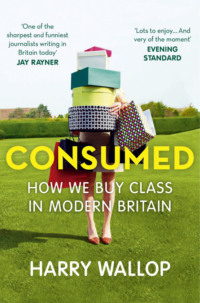
Consumed: How We Buy Class in Modern Britain
There are a small number of consumers who claim, with some legitimacy, to be entirely outside the consumer society – to never shop at a supermarket, to never fly abroad and to take great pleasure in shredding the Argos catalogue onto their compost heap. But these too are defined just as much by their opposition to the branded, consumer world as those who shop at JD Sports. And you’ll find a fair few of them happily scouring the John Lewis kitchen department or their local car boot fair and picking up a cut-price smoked salmon at Aldi.
Crucially, I hope to explain why this ability to define ourselves through what we buy or don’t buy is partly out of our control. Many of our choices have already been ‘edited’ by the shop, the restaurant, the food manufacturer, the holiday company. Sir Terence Conran – one of the towering figures in the rise of the consumer classes – was always very firm in refuting the idea that he ‘instructed’ people how to live their lives, that his restaurants and shops somehow imposed on us a manual for middle-class living. But though he was never as crass as to tell people that the only route to happiness was sipping an espresso or snuggling under a duvet, his ‘philosophy’ was choice editing. ‘I want to show people things they may not have seen before. After all, people can only buy what they are offered and what I want to do is offer them things in as honest and genuine way as I can manage; offer things that people may not have known they might want.’4
Over the last two generations one of the triumphs of capitalism has been consumer companies’ ability to anticipate what their customers wanted, or thought they wanted, and provide it for them. They have done this through relentless analysis of their customers, where they live, what they buy, when they shop. Supermarkets have been at the forefront of this trend, but others have learnt to be just as adept and spend millions of pounds every year to refine their marketing, their choice of stock and where they site shops. Often what you put into your basket or which outlet you visit is determined not by you, but by the company, many of whom have worked out exactly who they want through their doors. And who they don’t.
I too have tried to mine the data and find out more about these different middle classes – and indeed about those that are still outside the 70 per cent. From toffs to chavs, from posh wankers to gyppos. The class system still throws up terms of abuse with a vitriol that would be unacceptable when describing race, sex or age. Working class is only occasionally heard as a straight description; it is usually as a nostalgic badge of honour worn by those who have made it to the House of Lords. Instead we have the underclass, the benefits spongers, the feckless, the scroungers. What’s left of the upper classes, too, come in for an equally rough ride. Posh, public-school toffs are to be laughed at, in their ‘Look at my fucking red trousers’ and appearances in the pages of Tatler. The middle classes, in becoming ever wider, have pushed those outside of its ranks to the margin, so far away from normal life as to be comic-book creations fit only for ‘scripted reality’ shows.
Although this book is mostly concerned with products, shops and brands, it is really about people, all of them in some way members of the modern British consumer classes. Class does not reside in products, it only takes shape in ownership of those things or rejection of them. I hope their stories, and my story too, will explain a little bit about where we have ended up in Britain today.
Конец ознакомительного фрагмента.
Текст предоставлен ООО «ЛитРес».
Прочитайте эту книгу целиком, купив полную легальную версию на ЛитРес.
Безопасно оплатить книгу можно банковской картой Visa, MasterCard, Maestro, со счета мобильного телефона, с платежного терминала, в салоне МТС или Связной, через PayPal, WebMoney, Яндекс.Деньги, QIWI Кошелек, бонусными картами или другим удобным Вам способом.
Вы ознакомились с фрагментом книги.
Для бесплатного чтения открыта только часть текста.
Приобретайте полный текст книги у нашего партнера:
Полная версия книги
